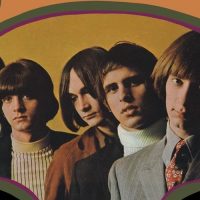The year 1967 was defined by new bands peddling new sounds, and Procol Harum was one such group perched at the top of the totem pole. That spring, the British band’s debut single “A Whiter Shade of Pale” flew to the No. 1 position in several countries, and wound up selling more than 10 million copies.
Crossing classical music flourishes with rock currents, aided by enigmatic prose, the dazzling “A Whiter Shade of Pale” truly dwelled in a universe all its own. Had Procol Harum never produced another slice of music, they would be still be forever revered on the strength of this masterpiece.
But thankfully, Procol Harum proceeded to issue further great music, fizzing with innovation and excitement. Consisting of lead singer and keyboardist Gary Brooker, lead guitarist Robin Trower, organist and lead singer Matthew Fisher, bassist Dave Knights, drummer BJ Wilson and lyricist Keith Reid, the band ably brought their individual skills to the party, making for a repertoire rife with varied notions and motions.
Procol Harum’s third album, A Salty Dog (A&M Records), plugs in as an exemplary illustration of their chameleon-esque complexion. Containing material ranging from celestial to industrial, the disc coils and curves and ebbs and tides with challenging and ambitious designs.
A flock of crying seagulls kick the title track off on a nifty nautical note, which also involves twilight-zone string arrangements pinned against a moody demeanor. Located on the opposite end of the spectrum is “The Devil Came From Kansas,” a frenzied rocker seething with a madcap mentality that’s downright unsettling.
Bursting with symphonic sophistication, “The Wreck of the Hesperus” captures Procol Harum returning to their classical origins in fetching fettle, while “Juicy John Pink” sizzles and smokes to a gutsy traditional blues beat.
A breezy calypso vibe is applied to “Boredom,” and “The Milk of Human Kindness” proposes a rather funky artsy fartsy angle. Then there’s “Crucifiction Lane,” a gospel-styled soul ballad, where the shimmering beauty of “Pilgrim’s Progress” closes the album in majestic form.
Musically busy, A Salty Dog features a broad array of engaging instrumentation exercises. Haunting Hammond organ passages, nimble piano work, electrifying guitar riffs and timely percussion complete the songs. The vocals and harmonies are potent and grand, and the melodies are crafty and peculiar.
Not a commercial success, A Salty Dog was a lot for the average music listener to digest, yet there is no question the album remains a noble artistic statement.
Although Procol Harum would experience personnel changes, the band plowed on and maintained a keen sense of experimentation. Properly regarded as certified kingpins of progressive rock, the group continues to play live today and occasionally release records.
Robin Trower did particularly well for himself shortly after leaving Procol Harum. In 1973, he put together the Robin Trower Band, and quickly gained the reputation as the exceptional hard-rocking blues guitarist he always was. Like Procol Harum, Trower keeps active on the tour circuit and in the studio.
- ‘Magic’ Wasn’t One-Hit Wonder Pilot’s Only Quirky, Radio-Ready Treasure - April 18, 2025
- How ‘Hollies Sing Hollies’ Showed New Promise After Graham Nash’s Exit - November 14, 2024
- Barry Melton on Country Joe and the Fish, Woodstock – and That Chant - August 15, 2024




